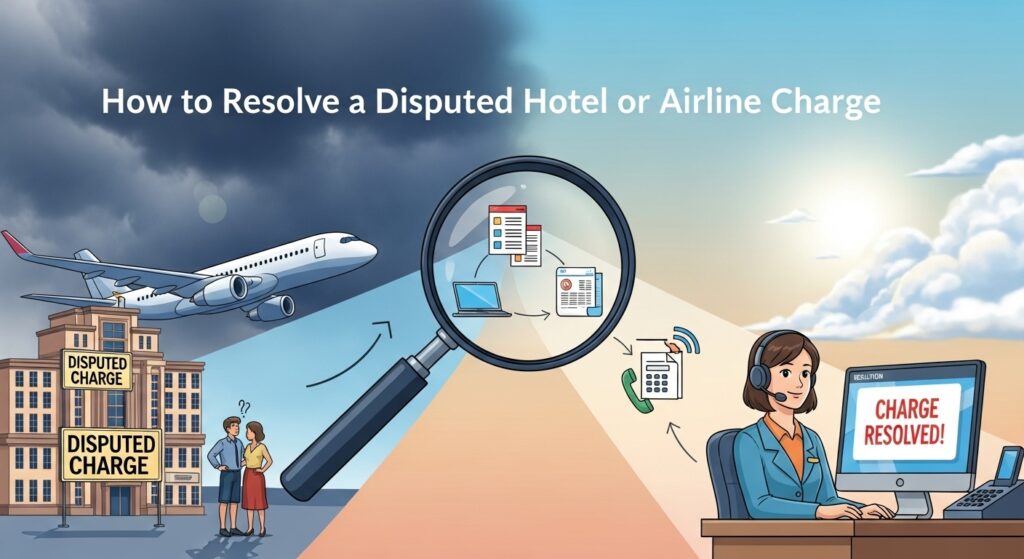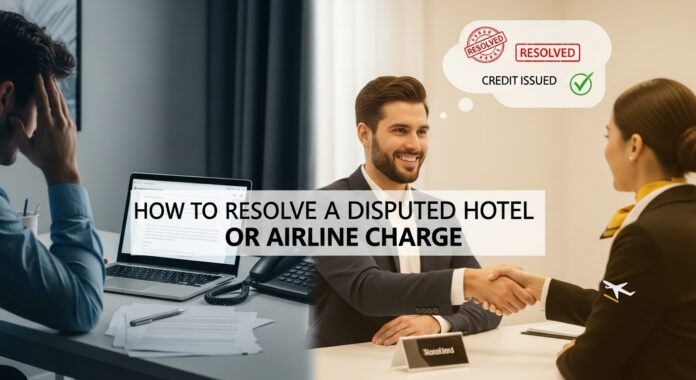Unexpected hotel or airline charges can cause stress and disrupt travel budgets. This step-by-step guide reveals exactly how to dispute these charges effectively, maximize your chances of a refund, and protect yourself from future billing errors.
What Is a Disputed Hotel or Airline Charge?
A disputed charge arises when you are billed incorrectly or unfairly by a hotel or airline. Examples include:
- Double-charging or overcharging for stays or flights
- Charges for reservations canceled within policy
- Unauthorized fees (resort fees, baggage fees)
- No-shows billed despite cancellations
- Hidden or undisclosed charges
Understanding your rights and the dispute process helps regain control over your money and avoid financial loss.

Why Are Hotel and Airline Charges Disputed?
Common reasons for disputes include:
- Billing mistakes: Mistakes in reservation systems or overcharges
- Cancellation policy misunderstandings: Fees applied after timely cancellations
- Unauthorized charges: Extras like minibar usage or tolls wrongly added
- Hidden fees: Taxes, resort fees, or surcharges not disclosed upfront
- Faulty service: No-show fees when the guest showed up, or downgraded flights
Recognizing the exact cause focuses your dispute strategy.
Step 1: Gather All Relevant Documents and Evidence
Before initiating a dispute, collect these key items:
- Booking confirmations or reservation emails
- Payment receipts and credit card statements
- Cancellation emails or proof of no-show notification
- Terms and conditions of the booking
- Communication with hotel or airline customer service
Clear, organized evidence improves your credibility and speeds up resolution.
Step 2: Contact the Hotel or Airline Directly to Resolve
Begin by addressing the issue directly with the service provider:
- Call the customer service or billing department
- Explain the billing dispute clearly and calmly
- Reference booking terms, cancellation policies, and proof
- Request a correction, refund, or fee waiver
- Take note of names, dates, and reference numbers of calls or emails
Many issues can be resolved at this level without escalation.
Step 3: Write a Formal Dispute Letter or Email – Use This Template

If direct contact fails, send a detailed dispute letter:
[Your Name]
[Your Address]
[Date]
[Hotel/Airline Name]
[Address]
Subject: Dispute of Incorrect Charge for Booking Reference [Booking Number]
Dear [Hotel/Airline Customer Service],
I am writing to formally dispute an incorrect charge on my account related to my recent booking [Booking Reference] for the dates [Stay/Flight Dates]. Despite following cancellation policy and confirming the cancellation on [Date], I have been billed [Amount] for [Charge Description].
Attached are copies of my reservation confirmation, cancellation proof, and billing statements highlighting the disputed amount.
I request a full refund of the erroneous charge within 14 days. Should this matter not be resolved, I will escalate this dispute to my credit card issuer and relevant consumer protection authorities.
Please confirm receipt of this letter at your earliest convenience.
Sincerely,
[Your Name]
[Contact Information]
Sending the dispute by registered mail or email with delivery/read receipt is recommended for evidence.
Step 4: Dispute the Hotel or Airline Charge with Your Credit Card Issuer or Bank
If the hotel or airline does not resolve your dispute satisfactorily:
- Contact your bank or credit card issuer immediately
- Report the disputed charge and provide documentation
- Request a chargeback — a reversal of the transaction
- Follow the bank’s instructions and timelines strictly
- Monitor your account for updates on the dispute
Most banks have transparent processes to protect consumers from unauthorized or unfair charges.
Step 5: Understand the Chargeback Process and Timeline
Chargeback processes usually involve:
- Consumer Initiates Dispute: You notify the card issuer
- Issuer Investigates: Bank examines the evidence you provide
- Issuer Requests Evidence from Merchant: Hotel/Airline must prove charges were valid
- Decision: Card network rules determine refund or charge retention
- Arbitration (if needed): Card network makes the final decision
This process can take from a few weeks to several months depending on complexity.
Step 6: Know Your Rights and Legal Protections
Being informed about consumer rights strengthens your case. Key protections include:
- EU Regulation 261/2004: Airlines must refund canceled flights and compensate delays
- US Department of Transportation Rules: Passengers have refund rights on canceled or significantly changed itineraries
- Credit card network policies: Visa, Mastercard provide chargeback protection for unauthorized charges
- Consumer protection laws in your country or the service provider’s location
Consult official consumer rights websites or legal advice for your jurisdiction.
Step 7: When to Escalate the Dispute Further
If banks and providers stall or reject your claim unfairly:
- File complaints with consumer protection agencies like Better Business Bureau or Aviation Authorities
- Use online dispute resolution platforms or travel ombudsman services
- Consider legal action if the disputed amount is significant
Being persistent and documenting every interaction is key.
Bonus Tips for Avoiding Hotel or Airline Charge Disputes
- Always confirm cancellation policies and keep proof of cancellation
- Use payment methods that offer fraud protection (credit cards over debit)
- Review bills carefully immediately after travel
- Take photos or screenshots of bookings, receipts, communications
- Opt for transparent providers with clear policies and customer service
Preventive measures cut disputes before they start.
Summary: Step-by-Step Guide to Disputing Hotel or Airline Charges
- Collect all bookings, receipts, and communication records
- Contact the hotel or airline customer service first
- Send a formal dispute letter using a clear template
- Dispute charges with your credit card issuer with full evidence
- Understand the chargeback process and your rights
- Escalate complaints through consumer protection agencies if needed
- Avoid disputes by documenting and reviewing all charges upfront
Following this structured approach maximizes your chances to recover money quickly and fairly.
